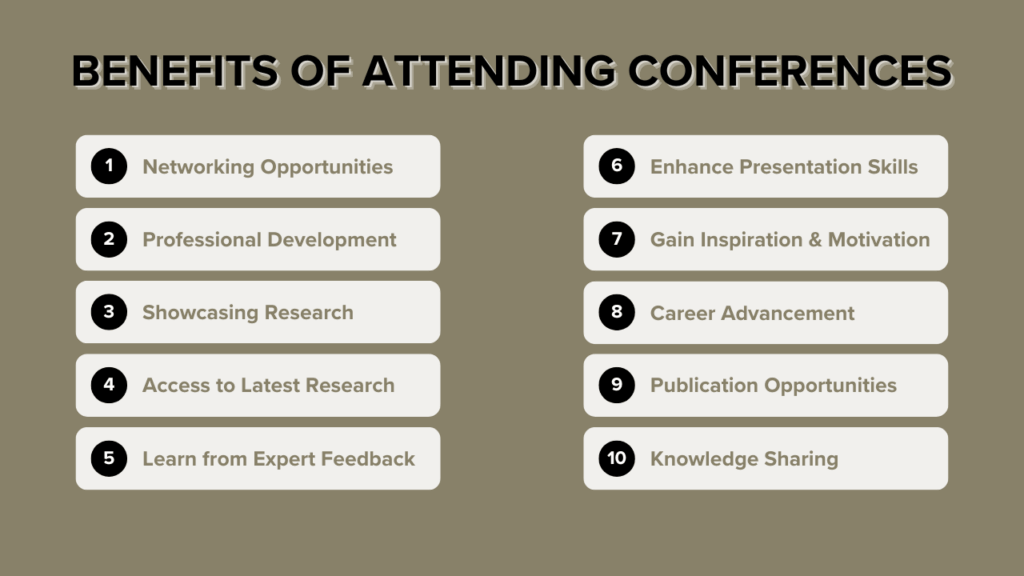18Sep

Attending academic conferences offers many advantages for PhD scholars who want to improve their research and grow professionally. The benefits of attending conferences go beyond just presenting your work. They give opportunities to meet other researchers, learn new skills, stay updated on the latest research, and grow personally. For PhD students, joining conferences is an important step in building a strong academic and professional profile.
Knowing the benefits of attending conferences helps scholars make the most of these events, boost their career prospects, improve their research, and expand their professional network.

One of the most significant advantages of attending conferences is the ability to build research networking opportunities. Conferences allow PhD scholars to meet leading experts, fellow researchers, and potential collaborators from around the globe. These interactions can lead to joint research projects, mentorship opportunities, and even career recommendations.
Networking is not just exchanging business cards—it’s about establishing meaningful professional relationships that support long-term academic growth. Networking events at conferences can be particularly valuable for initiating collaborations and gaining insights from experienced scholars.
Conferences provide excellent avenues for professional development for PhD scholars. Through workshops, seminars, and panel discussions, attendees learn new research methodologies, improve academic writing skills, and enhance presentation techniques.
By actively participating in academic conferences for PhD students, scholars can broaden their knowledge base, gain confidence in their work, and stay competitive in their field. Exposure to career-building sessions and grant-writing workshops also helps PhD students prepare for future opportunities.
Presenting research at PhD conferences allows scholars to share their findings with a larger academic community. This exposure increases visibility, helps refine ideas based on feedback, and enhances credibility.
Recognition from peers and senior researchers contributes to a strong academic reputation and can be influential when applying for research funding or academic positions. Presenting at research conferences also demonstrates a scholar’s commitment to their field.
Attending research conferences keeps PhD scholars updated on emerging trends, new methodologies, and innovative approaches in their discipline. Being aware of contemporary research enhances the relevance and impact of one’s own work.
By exploring sessions, poster presentations, and keynote lectures, scholars gain ideas that can improve their thesis, publications, and future projects. Access to cutting-edge research ensures that PhD scholars remain at the forefront of their field.
One unique conference participation advantage is receiving constructive feedback from experts and peers. Discussing research findings in a professional setting can uncover gaps, suggest improvements, and highlight strengths.
Feedback at conferences often proves invaluable for improving manuscripts before journal submission, ultimately increasing the chances of publication in top-tier journals.
Attending and presenting at scholarly events significantly improves communication and public speaking skills. Delivering a clear, concise, and impactful presentation helps scholars convey complex research effectively.
Strong presentation skills are essential not only for conferences but also for job interviews, academic defense sessions, and teaching responsibilities.
Networking events at conferences often lead to collaborative research opportunities. PhD scholars can find partners for joint studies, co-authored papers, or multi-institutional projects.
These collaborations can boost the visibility of research and increase publication opportunities, which are crucial for academic growth and career advancement.
Conferences expose scholars to diverse ideas and innovative projects. Attending sessions by renowned researchers or witnessing cutting-edge research presentations can inspire PhD scholars to explore new directions in their own work.
This motivation not only enhances productivity but also fosters creativity, helping scholars think beyond conventional approaches.
Participating in academic conferences is an excellent way to build a professional portfolio. Showcasing research, networking with industry experts, and learning about career trends can directly impact career progression.
Many PhD students secure postdoctoral positions, grants, or collaborations as a direct result of conference participation.
Many conferences allow participants to publish abstracts, papers, or full proceedings. These scholarly conference benefits add to a scholar’s academic profile and increase the visibility of their work.
Publishing in conference proceedings not only strengthens the CV but also provides citations, which are essential for research recognition and future funding opportunities.

Finally, attending conferences contributes to personal development. Engaging with global peers, handling Q&A sessions, and presenting work publicly builds self-confidence. These experiences cultivate leadership and problem-solving skills, which are essential for PhD scholars both academically and professionally.
The benefits of attending conferences as a PhD scholar are extensive. From networking, professional development, and research exposure to collaboration, inspiration, and personal growth, conferences are an indispensable part of the academic journey.
By actively participating in academic conferences for PhD students, scholars can enhance their research quality, expand their professional network, and gain recognition in their field. For comprehensive support in identifying, attending, and presenting at conferences, Kenfra Research offers expert guidance to maximize the advantages for PhD scholars.
95% UG seats filled in govt engineering colleges of Indore; It's great to hear that the government engineering colleges in Indore... read more
LNMU could refer to Lalit Narayan Mithila University, a well-known university in India. In legal contexts, the term "HC" typically... read more

PhD research is challenging. Between managing literature, taking notes, tracking tasks, and discovering the latest studies, it’s easy to feel... read more
5 Fully Funded Ph.D. Programs at US Colleges and Universities The specific details about fully funded Ph.D. programs can change, and... read more

A Ph.D. thesis is the culmination of years of research, hard work, and dedication. However, many scholars face challenges... read more

Writing a PhD research paper is a rigorous process that requires attention to detail, comprehensive research, and adherence to... read more
It's wonderful to hear that there has been a significant increase in the enrollment of girls in engineering courses in... read more

Publishing in IEEE journals is a significant milestone for engineering scholars seeking global recognition, academic credibility, and the opportunity to... read more
WhatsApp us
Leave a Reply